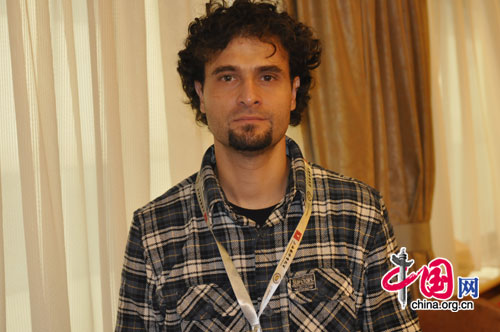Venezuelan director discusses challenges of filmmaking
- By Pang Li
 0 Comment(s)
0 Comment(s) Print
Print E-mail
China.org.cn, June 20, 2011
E-mail
China.org.cn, June 20, 2011
 |
|
Venezuelan director Alexis Mendez Giner is at the 14th Shanghai International Film Festival. [Pang Li/China.org.cn] |
In an exclusive interview with China.org.cn, Venezuelan director Alexis Mendez Giner discussed the challenges in making his award-winning short film "Centripetal" and also talked about the status of his country's growing film industry.
Giner won the People's Choice Award for his 7-minute short "Centripetal" at the Shanghai International Film Festival's first ever mobile phone film competition. The film, partially based on a true story, revolves around a quarreling couple who encounter a crime scene on a lost highway on a dark rainy night.
Giner said he made the film with $40,000 from the Venezuela Film Commission and developed the project for two and half years. It only took five days to shoot the film, however the shooting process was very challenging, he said.
To create the sequences of the two leading characters driving on a dark rainy night, Giner used three trucks to provide light, electricity and fake rain. The three trucks, along with a car that actors were driving lined up "like a train," he said. For the actor who plays a dead man, the makeup process alone took three hours. "I cannot tell you how difficult it was," he said.
After finishing shooting, he went to Miami, Los Angeles and other places to complete the film's postproduction. "Making film is like doing errands. You do this, do that. Finally you get your things done," he said.
Giner developed an affinity for the cinema at a very young age, watching films in his spare time. Inspired by French new wave filmmakers and Italian directors such as Jean Luc-Godard, Federico Fellini and Michelangelo Antonioni, he decided to become a filmmaker while in high school. After graduating from universities in Venezuela and the U.S., he started his career by making TV commercials. He also made some visual art pieces, one of which was exhibited in Hong Kong, he said. He is now planning to make his first feature film.
Currently, the Venezuelan film market, overwhelmed by American films, leaves little room for domestic productions. With absence of big film studios, every filmmaker is independent and theaters take responsibility for distributing films. The Venezuelan market so far only has "a seed" of a local film industry, producing about 20 feature films every year, Giner said.
Most film industry professionals make a living by producing TV commercials and often have to take on several jobs simultaneously to earn enough money, Giner said. For directors, "breaking into the [TV commercial] business is tough, because, as always, they are lots of directors who want to do that," he said.
Giner said the industry is now slowly changing for the better. "In the past, filmmakers used to learn the business [while] doing it. Nowadays, more and more filmmakers go to study at [universities] and then return to shoot [films]," he said.
In addition, Giner said the Venezuelan government encourages and protects local filmmakers with laws which encourage creativity. According to one law, the government has to provide certain amount of money for filmmakers every year and theaters have to run domestic films for at least several weeks following their release. In addition, another law stipulates that commercials showed on Venezuelan TV have to be shot in the country. As a result, 80 percent of advertisements shown on local TV are made in Venezuela, Giner said.
"Venezuela has the most advanced film laws in the Americas," Giner said. "The laws really protect [local filmmakers]."






Go to Forum >>0 Comment(s)